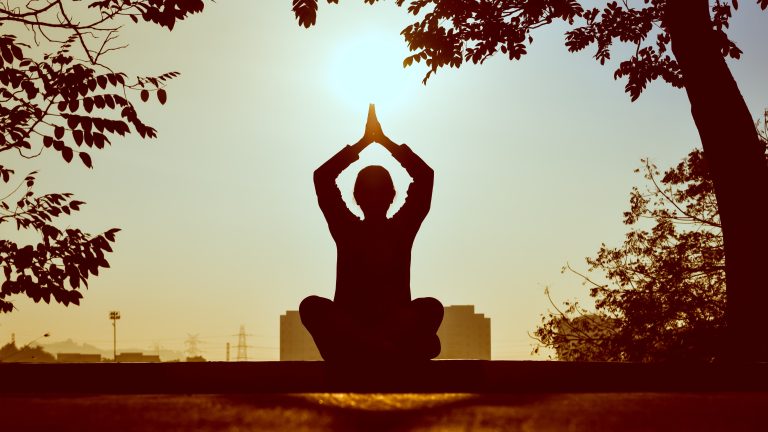Introduction
Waking up energized and refreshed is essential for good health, but many people struggle to get a good night’s sleep. In today’s busy world, finding ways to relax and unwind before bedtime is more important than ever. That’s where guided meditation comes in.
Guided meditation is a technique that uses spoken words and soothing sounds to help you relax your mind and body. It can be done on your own or with the help of an app or audio recording. The goal of guided meditation is to quiet your thoughts and focus on the present moment, allowing you to drift off into a peaceful sleep.
In this article, we’ll explore the benefits of guided meditation for sleep and share some tips on how to incorporate it into your bedtime routine. Whether you’re dealing with insomnia or just want to improve the quality of your sleep, we hope you’ll find this information helpful.
Download the app today!
Understanding Sleep Meditation
The quest for a good night’s sleep begins with understanding the concept of sleep meditation. It’s a specific form of meditation that aims to help individuals fall asleep quickly and sleep more deeply.
Sleep meditation is an exercise in mindfulness, where one focuses on their breath, body sensations, or a particular object to draw attention away from random thoughts and induce relaxation. It involves calming the mind and preparing it for deep, restorative sleep.
How Sleep Meditation Helps You Achieve Deep Sleep
Diving into the mechanics of how sleep meditation aids in achieving deep sleep reveals fascinating insights. It plays a pivotal role in shifting brainwave patterns, specifically from higher frequency beta waves (associated with alertness) to lower frequency theta waves (linked to drowsiness).
Scientific research bolsters these claims. A study published in JAMA Internal Medicine highlighted that participants who practiced mindfulness techniques, such as sleep meditation, reported less insomnia, fatigue, and depression compared to those who didn’t meditate.
Understanding the science behind sleep meditation unravels its profound impact on brain patterns:
- It triggers the release of melatonin, the hormone responsible for regulating sleep-wake cycles.
- It decreases cortisol levels – stress hormones that can interfere with good quality sleep.
- It reduces brain chatter associated with anxiety and overthinking, which often hinders falling asleep.
Grasping these nuances prompts an exploration of the potential benefits of guided meditations crafted explicitly for enhancing sleep quality.

Meet your Happiness Goals on Happily
Our Relevant Products
Feel Calm
Feel Motivated
Mindful Relationships
Personal Growth
Brtter Sleep
Slowing Down
and many more...
Benefits of Using Guided Meditation for Sleep Enhancement
Guided meditation for sleep harnesses the power of relaxation and visualization to achieve a state conducive to restorative sleep. The practice offers multiple benefits that collectively work towards enhancing the quality of slumber:
1. Reducing Stress and Anxiety Levels for a Calm Mind
A primary advantage is the ability of guided sleep meditation to lower stress and anxiety. During these sessions, individuals are led through techniques that focus on breathing and mindfulness, which have been shown to decrease the production of stress hormones like cortisol. This calmer mental state facilitates an easier transition into deep sleep.
2. Enhancing Relaxation Response in the Body
Through guided imagery and progressive muscle relaxation, listeners can activate their body’s natural relaxation response. This not only soothes tense muscles but also helps regulate heartbeat and breathing rates, creating optimal conditions for entering the phases of deep, restful sleep.
3. Improving Overall Sleep Quality and Duration
Engaging regularly in guided meditation for sleep has been linked with longer periods of uninterrupted sleep, less nighttime awakenings, and improved sleep cycle efficiency. This overall enhancement in sleep quality can contribute to better health outcomes and a more energized feeling upon waking.
For those seeking to delve deeper into these benefits, understanding the guided sleep meditation benefits can serve as an invaluable resource. By integrating these practices into their nightly routine, individuals may experience a noticeable improvement in their ability to fall asleep quickly and wake up feeling refreshed.
Different Types of Guided Meditations to Try for Optimal Sleep
Guided meditations come in various forms, each offering unique pathways to tranquil rest. Here are three distinct types that can cater to your nighttime routine:
1. Bedtime Meditations to Induce a State of Serenity and Let Go of the Day
Bedtime meditation serves as a soothing bridge between the hustle of the day and the quiet of the night. This type of meditation typically involves:
- Mindful Breathing: Focusing on the breath helps calm the mind, signaling the body it’s time to wind down.
- Progressive Relaxation: Gradually tensing and then relaxing different muscle groups releases physical stress, preparing you for restful sleep.
- Guided Imagery: Visualizing peaceful scenes can shift your mental state away from daily worries.
2. Night Journey Meditations for Deep Exploration and Restorative Rest
Night meditation guides you through a journey, often using storytelling or visual journeys to:
- Engage the Imagination: By picturing serene landscapes or calming experiences, your mind transitions into a dream-like state conducive to sleep.
- Foster Subconscious Healing: The narratives often include themes that promote emotional release and subconscious healing.
3. Tranquil Guided Visualizations to Release Tension and Invite Peaceful Slumber
Tranquil guided visualizations focus on creating vivid mental images that:
- Foster Deep Relaxation: Beautiful and serene scenarios help relax both mind and body.
- Enhance Mental Clarity: Clearing the mind of clutter before bed can lead to improved sleep quality.
Each modality offers a unique approach to easing into night time meditation, helping you release the day’s tension for a more serene transition into sleep.
Download the app today!
Incorporating Guided Meditation into Your Nightly Routine: A Step-by-Step Guide
Embarking on a journey towards blissful slumber with deep sleep meditation involves more than just pressing play on a guided session; it requires setting the stage for tranquility. Here’s how to seamlessly integrate this practice into your evening routine:
Create a Soothing Atmosphere
- Dim the lights: Soft lighting signals your brain that it’s time to wind down.
- Comfort is key: Arrange pillows and blankets to ensure you’re at ease.
- Minimize disruptions: Silence notifications and establish a quiet environment.
Find Your Ideal Guided Meditation Resource
- Research: Look for apps or online resources that offer a variety of deep sleep meditation sessions.
- Sample different voices and styles: The right narrator can make a significant difference in your relaxation experience.
- Prioritize quality: High-definition audio helps maintain focus and enhances the immersive nature of the meditation.
By attending to these details, you lay the groundwork for deep sleep meditation to work its magic, leading you gently towards a state of restorative rest.
Tips to Maximize the Effectiveness of Guided Meditation for Deeper Sleep
Maximizing the benefits of guided meditation for sleep can transform a tumultuous night into a haven of restfulness. Below are essential strategies to enhance the effectiveness of your practice:
Consistency Is Key – Establishing a Regular Meditation Habit
- Designate a specific time for meditation: By meditating at the same time each evening, your body begins to associate this time with winding down, making it easier to transition into sleep.
- Short sessions count: Even brief periods of guided meditation can yield significant benefits. Aim for at least 5-10 minutes if a longer session isn’t feasible.
- Track your progress: Use a journal or an app to keep track of your meditation habits. This can serve as motivation and help you identify patterns that contribute to better sleep.
Extending Mindfulness Beyond the Cushion throughout Your Day

Happily Workplace
Enhance employee happiness, propel their life skills and build a culture of happiness and success at your workplace!
- Mindful moments: Incorporate mindfulness practices during daytime activities, such as mindful eating or walking. This helps reduce stress levels cumulatively over the day.
- Breathing exercises: Simple breathing techniques, practiced during breaks or moments of stress, can help manage anxiety and prepare the mind for evening guided meditations.
- Reflective pauses: Take intentional pauses to reflect on your current state of mind and body. Acknowledge stress without judgment and gently guide yourself back to a state of calm.
By embedding these practices into your daily life, you create a conducive environment for restorative sleep, allowing guided meditations to work more effectively when you finally lay down to rest.
Exploring the Synergy of Guided Sleep Meditation with Other Relaxation Techniques
Guided sleep meditation, when combined with various relaxation techniques, can enhance the benefits of your wind-down routine. This synergy allows for a personalized approach to relaxation, one that suits your unique needs and preferences. Consider these combinations:
1. Progressive Muscle Relaxation
Pairing guided sleep meditation with progressive muscle relaxation can be particularly effective. This technique involves tensing and then relaxing different muscle groups in sequence, promoting physical calm that complements the mental serenity gained from meditation.
2. Aromatherapy
Incorporating aromatherapy into your practice can enhance the sensory experience of guided sleep meditation. Essential oils like lavender or chamomile create a peaceful atmosphere, paving the way for deeper relaxation.
3. Breathing Exercises
Integrate breathing exercises such as the 4-7-8 method or diaphragmatic breathing with your guided meditation sessions. Conscious control of breath not only helps in centering your thoughts but also assists in reducing heart rate and blood pressure, encouraging a state conducive to sleep.
4. Yoga Nidra
Yoga Nidra, or ‘yogic sleep’, is a form of meditation that induces deep relaxation while maintaining awareness. Combining it with guided sleep meditation scripts can help in achieving restorative rest.
Experimenting with these combinations can lead to discovering which methods work best for you for optimal restfulness. The key is to personalize your experience to ensure that each night’s journey into slumber is both peaceful and rejuvenating.

Meet your Happiness Goals on Happily
Our Relevant Products
Feel Calm
Feel Motivated
Mindful Relationships
Personal Growth
Brtter Sleep
Slowing Down
and many more...
Conclusion
Embrace the transformative power of guided meditation and unlock the door to restful nights. The ultimate guided meditation for blissful slumber is more than a nighttime ritual; it’s a journey towards consistent, quality rest.
By incorporating this practice into your life, you can:
- Harness the benefits of deep, peaceful sleep
- Awaken refreshed and revitalized each morning
- Cultivate a serene mindset for the day ahead
Step into a world where each night is an opportunity for rejuvenation and tranquility. Let guided meditation be your guide to the land of dreams.
Join our newsletter
FAQs(Frequently Asked Questions)
What is the ultimate goal of Sleep Like a Baby Tonight: The Ultimate Guided Meditation for Blissful Slumber?
The ultimate goal is to wake up energized and refreshed, which is essential for good health.
How does sleep meditation aid in achieving deep sleep?
Sleep meditation aids in achieving deep sleep by triggering the release of melatonin, the hormone responsible for regulating sleep.
What are the benefits of using guided meditation for sleep enhancement?
The benefits include reducing stress and anxiety levels, enhancing relaxation response in the body, and improving overall sleep quality and duration
What are the different types of guided meditations to try for optimal sleep?
There are bedtime meditations to induce a state of serenity, night journey meditations for deep exploration and restorative rest, and tranquil guided visualizations to release tension and invite peaceful slumber.
How can one maximize the effectiveness of guided meditation for deeper sleep?
One can maximize the effectiveness by establishing a regular meditation habit, extending mindfulness beyond the cushion throughout the day, and exploring the synergy of guided sleep meditation with other relaxation techniques such as progressive muscle relaxation, aromatherapy, breathing exercises, and yoga nidra.
What is the conclusion regarding guided meditation for blissful slumber?
The conclusion is to embrace the transformative power of guided meditation and understand its impact on achieving restful and rejuvenating sleep.






